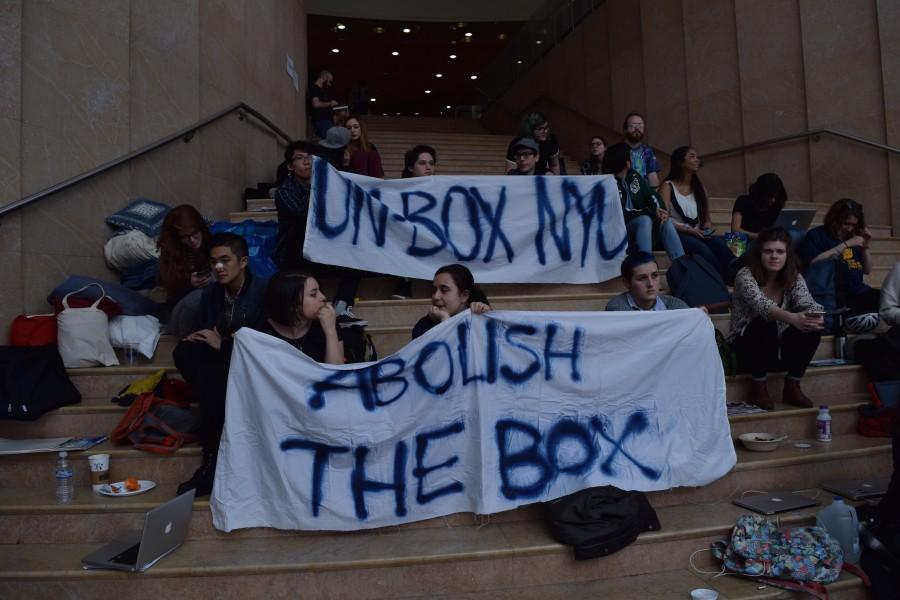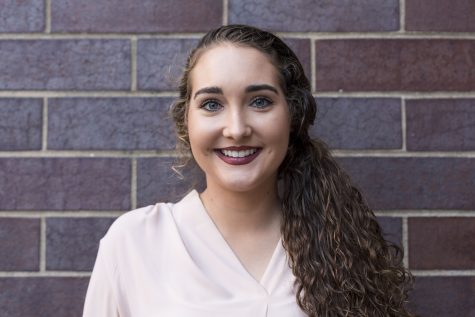IEC Gets Previously-Promised Meeting with President Hamilton
A 33 hour sit-in in March seems to have persuaded the university to change its policy regarding asking applicants about criminal background.
April 26, 2016
Incarceration to Education Coalition organizers met with NYU President Andrew Hamilton on Monday afternoon to discuss banning the box at NYU. IEC was granted a meeting with Hamilton after a two-day occupation of the Kimmel Center for Student Life earlier this month.
Organizers were given one hour to present their case to Hamilton for removing the box — questions concerning an applicant’s criminal or disciplinary history — from NYU’s undergraduate Common Application.
Only four members were present for the meeting, which was not open to the public. In addition, IEC organizers were not permitted to record the conversation with Hamilton, which was a point of contention when IEC negotiated with NYU administration on April 26.
Wagner student and IEC organizer Sheba Rivera attended the discussion and said the administration’s decision to not make the meeting public demonstrated a lack of transparency. However, Rivera said she was grateful for Hamilton’s willingness to engage in conversation with IEC and that she thought their presentation illuminated facts Hamilton might not have previously considered.
For instance, Rivera said the IEC had presented a figure showing that only 4.8 percent of enrolled students at NYU were of African-American descent. Meanwhile, Rivera said Hamilton thought that this figure accurately represented the proportion of African-Americans in the nation. In reality, African-Americans make up 13.2 percent of the U.S. population.
“I think that was a learning experience for him,” Rivera said. “To understand that the diversity in our nation and in the world is missing from NYU’s student body.”
NYU has worked with the IEC in the past with this movement, most notably a letter sent in January to the Common App calling for more research into the box’s effects on applicants and campus safety.
Gallatin alum and IEC organizer Eric Sturm said he did not understand why the university is pushing for more research when research already exists.
“NYU has all their own data on who they admit, crime on campus and how these rates changed before/after implementing the box in 2006,” Sturm said. “This is another way of saying we’re putting white anxieties over access to education for marginalized groups. If they want research so badly they can do it right now and publish the results tomorrow.”
Rivera reiterated this, saying she does not feel NYU can conduct adequate research on the box’s effects while it is still on applications because it creates a chilling effect — deterring people who are formerly incarcerated from applying because they know the university will ask for their criminal history. Rivera added that she feels NYU’s current steps towards banning the box, such as initially reading applications box-blind, are not enough because people are discouraged from even applying to the university when they see the box.
“There’s a great many people that are probably just not applying,” Rivera said. “To change the inequality that has been perpetuated by mass incarceration, is to abolish the box.”
NYU spokesperson Matt Nagel released the following statement to WSN on behalf of the administration following Monday’s meeting.
“NYU President Andrew Hamilton considers his meeting with the IEC to be both productive and constructive,” the statement read. “He looks forward to additional research and continuing the conversation on these important issues.”
Rivera said she is eager to see what Hamilton does with information given to him.
“I have to be optimistic,” Rivera said. “President Hamilton said he is coming at it with an open mind, so we are taking him at his word — that he is going to seriously take a look at the information and the research we have presented to him.”
Email Lexi Faunce and Anne Cruz at [email protected]


























































































































































